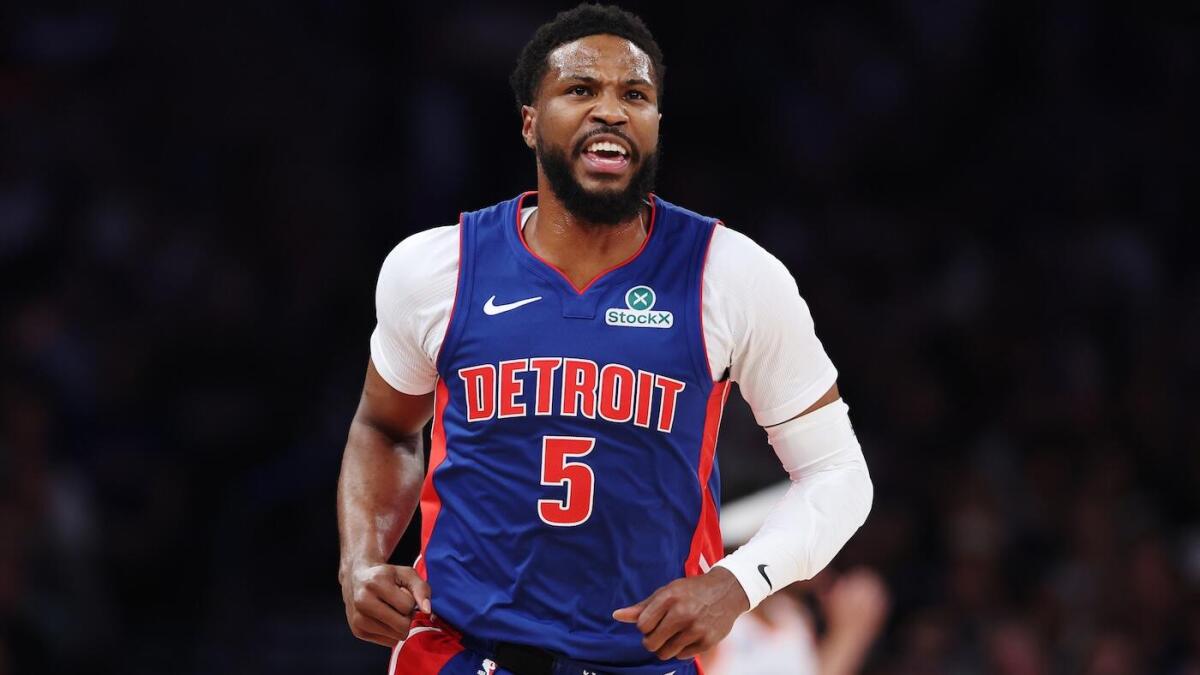The recent federal investigation into Malik Beasley, a key guard for the Detroit Pistons, has sent shockwaves through the NBA landscape, casting a shadow over one of the league’s most promising free agents ahead of the 2025 season. This development not only threatens Beasley’s standing but also highlights the NBA’s ongoing struggle with gambling issues, the impact on team dynamics, and the broader implications for player contracts and league integrity.
Malik Beasley’s Rise as a Key Player and Free Agent
Malik Beasley, now 28, has become an indispensable scorer and sharpshooter for the Detroit Pistons. Last season, he averaged 16.3 points per game while playing in all 82 regular-season contests, showcasing his reliability and consistency. His ability to space the floor—evidenced by a 41.6% three-point shooting rate—made him a critical piece of Detroit’s offensive strategy. These performances positioned him as one of the top free agents entering the 2025 offseason.
Before the investigation came to light, Beasley and the Pistons were reportedly deep into negotiations for a lucrative contract extension. The discussions centered around a three-year deal worth approximately $42 million, reflecting the team’s commitment to retaining him as a cornerstone of their rebuild. This agreement would have solidified Beasley’s role as a leader and a key contributor to Detroit’s future success.
Federal Investigation and Allegations: A Serious Development
The U.S. District Attorney’s office has launched a federal probe into Beasley, alleging gambling activity related to NBA games and prop bets. This investigation, first reported by prominent sports journalists, raises serious concerns about potential violations of NBA rules and federal statutes. Gambling has long been a sensitive issue in professional sports due to its potential to compromise fair play and league integrity.
The NBA’s collective bargaining agreement and league policies explicitly prohibit players from engaging in gambling that could influence games or raise questions about impartiality. Prop bets—wagers placed on specific in-game occurrences—are particularly problematic, as they can subtly influence player behavior or damage the league’s reputation. While details of the allegations remain undisclosed, the investigation alone has been enough to halt contract negotiations and cast doubt on Beasley’s immediate future in the NBA.
Impact on Contract Negotiations and the Pistons’ Offseason Strategy
The investigation has had an immediate and disruptive effect on the Pistons’ roster planning and financial commitments. The anticipated three-year, $42 million contract talks have reportedly been put on hold, forcing the team to adopt a cautious approach amid legal uncertainties. For Detroit, which is aiming to build on its young core and recent competitive improvements, this pause disrupts momentum and complicates salary cap management.
Beyond Beasley, the Pistons must now navigate the offseason without clarity on one of their primary contributors. This uncertainty forces them to reevaluate their free agency strategy and internal development plans. Reallocating funds to maintain team chemistry or exploring alternative signings may become necessary, further complicating their efforts to compete in the Eastern Conference.
The case also serves as a distraction for a franchise that has been working to establish itself as a rising contender. Beasley’s presence was seen as complementary to other emerging talents, such as Cade Cunningham, and integral to the team’s offensive identity. With his status now in question, the Pistons must balance short-term disruptions against long-term vision.
Broader NBA Context: Gambling Regulations and Player Conduct
Beasley’s situation underscores the NBA’s ongoing challenges in regulating gambling among players. Since the league’s 2005 agreement with the National Basketball Players Association (NBPA), strict guidelines have been in place to prevent gambling-related compromises to competition. Despite the legalization and growing popularity of sports betting, these rules remain critical in maintaining the integrity of the game.
This high-profile investigation reinforces the NBA’s unwavering stance on gambling. Past incidents involving player suspensions for gambling-related offenses demonstrate the league’s willingness to enforce penalties to deter misconduct and preserve fan trust. The rise of prop bets, which are often facilitated through digital platforms, adds complexity to enforcement efforts. The NBA must remain vigilant in distinguishing between harmless engagement and illicit behavior, and Beasley’s case could set a precedent for future gambling-related cases.
Potential Outcomes and Consequences for Beasley and the Pistons
The resolution of this investigation will significantly influence Beasley’s career trajectory. If found culpable of prohibited gambling activity, he could face suspensions, financial penalties, or even more severe league-imposed sanctions. Such consequences would diminish his market value, earning potential, and legacy within the NBA.
Conversely, if the investigation clears him or the allegations are mitigated, Beasley’s value may rebound, allowing the Pistons to resume and finalize contract discussions. However, even in the best-case scenario, the cloud of doubt may reduce his leverage in negotiations.
For the Pistons, the stakes include whether to maintain faith in Beasley’s role as a long-term asset or pivot toward reallocating resources elsewhere. This could mean investing more heavily in other free agents or focusing on internal talent development. The team must weigh the risks and rewards of retaining Beasley against the potential benefits of exploring alternative options.
Conclusion: Navigating the Crossroads of Integrity and Opportunity
The Malik Beasley gambling investigation serves as a cautionary tale about the delicate balance between player freedom and the responsibility to uphold professional standards in the NBA. As one of the league’s most prominent upcoming free agents, Beasley’s position is precariously poised amid serious legal and ethical questions.
For the Detroit Pistons, this development has paused a promising contract negotiation and injected uncertainty into their offseason strategy. The team must now recalibrate its priorities as it continues its pursuit of competitive growth. Meanwhile, the NBA must navigate the evolving landscape of sports gambling regulation, emphasizing transparency, fairness, and accountability.
Regardless of the final outcome, Beasley’s case will likely resonate as a defining moment for how the NBA addresses gambling allegations, influences player conduct, and preserves the integrity on which professional basketball is built. The forthcoming months will be pivotal in shaping not only Beasley’s career but also the league’s approach to this ongoing challenge.

